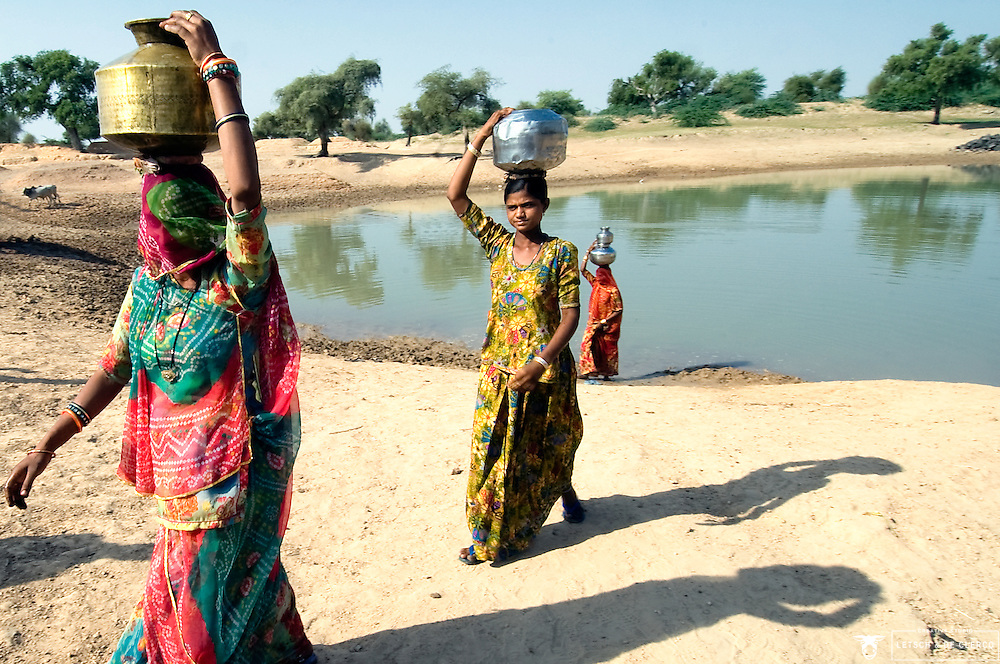Women and children in water-tight countries have always had to bear the task of going down to the well or pump or stream and collect water. It’s unavoidable. Without water they would not be able to survive so what else can they do apart from walk miles everyday for water, clean or dirty. It won’t make a difference to whether or not it will be drunk. 200 million hours everyday is spent fetching water and as the scarcity increases, so will the hours. Water scarcity is much deeper than not being able to access water close by. But why?
Why is it a woman’s job? Men feel that because they gave the family of their wife-to-be cows, money or something of value, that they’ve bought their marriage. This is why as a silent vow, the women do the chores. It’s the exchange made for the gifts. Complaining about the body aches due to the laborious tasks or the dangerous journey is seen as a failure to keep their vow. A rather striking thing though is that in India and perhaps other countries, men have started to have “Water Wives”. Meaning that they’re marrying multiple women for the sole purpose of having more women to collect the water. They’re normally widows or single mothers who want respect within their communities, and being betrothed grants that. Both sides seem to gain something and yet the task of fetching the water is still massive. Especially in the communities where this practice of “Water Wives” takes place.
Having to travel for water is a vicious cycle, especially when dirty. Everything in life revolves around the usage of water. It’s used in cooking, hygiene, in watering plants and of course, used to drink. Contaminated water can lead to diarrhea, stomach and intestinal cramps, dehydration and worst of all, death. But when this is the only water that’s available, there’s no such thing as picking and choosing, water is water and without it we would die of dehydration. This is why a lack of water and choice between water clarity is so dangerous. No water means no life, but dirty water means a sick life.
The duty to fetch water also makes young girls miss out on school. In some cases, the journey can take up half the day leaving the poor girls shattered by the end of it. Walking for hours on end with litres of water to carry is very tiring and puts a lot of stress on the children. It doesn’t leave time to get an education which is what they need to not only keep their minds engaged but also to have a gateway to leave the cycle. With education they can go to universities and expand their world view. This is why Malala Yousafzai fought for young girls in Pakistan to be allowed to continue to learn. It grants opportunities and opportunities are what people need to be able to escape the cycle of fetching water until they grow old. Education is recognised as a human right, but it’s been pushed back as water takes the priority.
All over the world the rates of gender based violence, sexual and/or physical, are despicable. Almost 1 in 3 women worldwide have been subject to intimate partner violence or non-partner related sexual violence. In the case of the water crisis, it leaves young girls and women open to these sorts of attacks as they can travel for hours each time they need to get more water. But it isn’t just dangerous people these girls need to look out for, wild animals, and flash floods. It can become very dangerous, especially if the water they’re fetching is making them sick and less vigilant or not strong enough to survive said attacks.
Wells and pumps cannot be made in these water stricken communities without money though. These issues cannot be solved without action. Young girls cannot make much of their lives when their top priority is fetching water for their families. This is why water.org is fundraising. To aid these communities and make sure that young girls are in school, that families are safe and that water is clean.
Sources:
https://water.org/our-impact/water-crisis/womens-crisis/
https://theconversation.com/women-still-carry-most-of-the-worlds-water-81054
